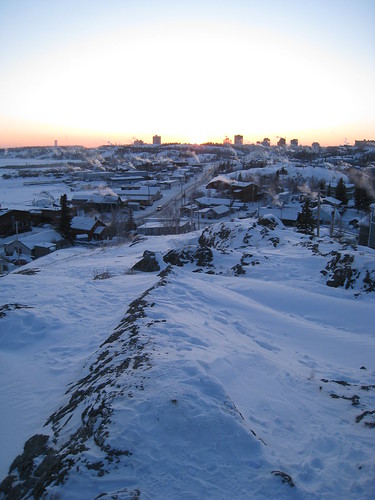Yellowknife wildfire: traffic clogs road out of town as residents race to evacuate
Yellowknife #Yellowknife

Long lines of traffic haves clogged the only road out of the Canadian city of Yellowknife, after authorities ordered the first ever evacuation of a provincial capital in the face of an advancing wildfire.
More than 20,000 residents – the entire population – have been given until noon on Friday to leave their homes, as water bombers flew throughout the night and authorities warned that the fire could reach the city by the weekend.
Evacuation flights are also due to begin on Thursday afternoon, and will continue until the entire population has safely left the city, said the Yellowknife mayor, Rebecca Alty. She warned residents to bring water and food with them to the city’s airport as they could face long waits to get on a flight.
The out-of-control wildfire – which was least measured at 163,000 hectares wide (402,000 acres) – is currently 16km from Yellowknife, the capital of the vast and sparsely populated Northwest Territories. The city lies roughly 250 miles south of the Arctic Circle.
The blaze has also prompted the evacuation of several other nearby towns, including the Dene First Nation communities of N’dilo and Dettah.
“The reality is we’ve been fighting this fire for over a month. This fire has burned deep, this fire has burned hot, and it has found ways through multiple different sets of established [control] lines,” said Northwest Territories fire information officer Mike Westwick.
As thick smoke blanketed the city, traffic had backed up the main road leading towards the town of Fort Providence, where hundreds of people spent the night sleeping in their cars in the parking lot of a service station.
Linda Croft, the manager of the Big River service station, said that traffic had been heavy since Wednesday morning as people attempted to escape. “It’s lined up right back along the highway, no end in sight,” she said.
Canada is enduring its worst wildfire season, with more than 1,000 active fires burning across the country, including 236 in the Northwest Territories. Roads out of the region also pass through areas with active fires.
More than 2m hectares of the territory have been burned this season, and more than half of its population is now under evacuation order.
On the other side of Great Slave Lake, residents of the village of Hay River were told to leave Sunday.
Garth Carman, who drove out with his 16 cats, described witnessing scenes like “the apocalypse”, with bears and other wild animals burned alive on the roadside.
“A wall of flames just washed over the highway and trees just began exploding in the fire – poof, poof, poof – one after the other, coming towards us. It was hell driving through this,” he told CBC.
About 39km south of Hay River, the town of Enterprise has been 90% destroyed by fire.
This handout photo shows the town of Fort Smith. Photograph: AFP/Getty Images
Shane Thompson, the minister for municipal and community affairs, said on Thursday that people now leaving Yellowknife will have to drive 15 hours south to Leduc, Alberta, to find accommodations, as the other evacuation centres in between the two communities are now full.
Alty said the Yellowknife evacuation had been called early to give people time to escape before the fire moves closer to the highway.
“The highway is subject to closures at any time. Conditions will be smoky, and residents should drive with caution and care,” she said. “This is an incredibly difficult time for everyone. Please look out and help one another as you can. If you’re driving, and have space, please consider bringing a friend or pets.”
Residents are using Facebook groups to coordinate evacuations and check in with neighbours.
However, because of the Meta ban on news-sharing in Canada, people are unable to share links on Facebook and Instagram to news stories with information on evacuations and other fire-related news.
In one of Alty’s Instagram stories, she wrote simply: “Listen on CBC Radio or the web.”
This summer saw the hottest day ever recorded in the far north of the country when Fort Good Hope – a community about 500 miles north-west of Yellowknife – hit 37.4C (99.3F).